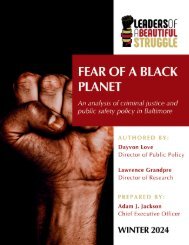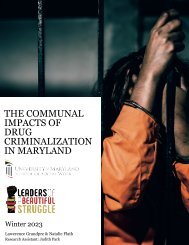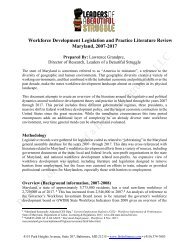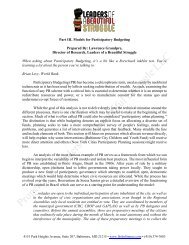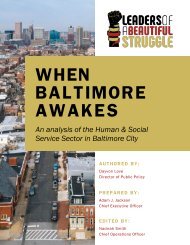Drug Decriminalization in Maryland Through an African Centered Research Paradigm- Analysis and Recommendations
This document offers guidance for theorizing questions related to a proposed research project purposed to advance drug decriminalization in Maryland.
This document offers guidance for theorizing questions related to a proposed research project purposed to advance drug decriminalization in Maryland.
- No tags were found...
You also want an ePaper? Increase the reach of your titles
YUMPU automatically turns print PDFs into web optimized ePapers that Google loves.
paradigms <strong>an</strong>d tools created by the social sciences of a “free market society” to attempt to solve<br />
the problems this society produces (i.e., addiction).<br />
Alternative Methodologies - Afric<strong>an</strong> Americ<strong>an</strong> <strong>Research</strong> <strong>Paradigm</strong>s<br />
While the ten<strong>an</strong>ts of the research Schiele outl<strong>in</strong>es may represent the ten<strong>an</strong>ts of the dom<strong>in</strong><strong>an</strong>t<br />
methodology of scientific research, it is not the only paradigm available. Here we c<strong>an</strong> beg<strong>in</strong> to<br />
<strong>an</strong>alyze what I call Afric<strong>an</strong> <strong>Centered</strong> <strong>Research</strong> <strong>Paradigm</strong>s. I use this specific term as it is <strong>in</strong>clusive<br />
of multiple different ways of describ<strong>in</strong>g research methodologies guided by the culture, knowledge<br />
production practices, <strong>an</strong>d experiences of people of Afric<strong>an</strong> descent. As there is diversity with<strong>in</strong><br />
Afric<strong>an</strong> peoples, there are multiple different Black scholars with different versions of what could<br />
be called Afric<strong>an</strong> <strong>Centered</strong> <strong>Research</strong> <strong>Paradigm</strong>s. The goal here is not to attempt to parse one from<br />
the other meticulously but to take a general conceptual underst<strong>an</strong>d<strong>in</strong>g of what the paradigms br<strong>in</strong>g<br />
to the research process <strong>an</strong>d what general characteristics reflect researchers us<strong>in</strong>g these<br />
methodologies. One additional note on term<strong>in</strong>ology, m<strong>an</strong>y scholars use the term “Afrocentric” to<br />
describe these practices, <strong>in</strong>clud<strong>in</strong>g m<strong>an</strong>y who will be cited <strong>in</strong> this report. As this term is used<br />
<strong>in</strong>creas<strong>in</strong>gly to describe the specific methods of research produced by Temple University professor<br />
Molefi As<strong>an</strong>te <strong>an</strong>d his academic disciples, we feel it is more accurate to use the term “Afric<strong>an</strong><br />
<strong>Centered</strong>” to reflect the diversity of scholars beyond those directly affiliated with As<strong>an</strong>te <strong>an</strong>d<br />
Temple University.<br />
Na’im Akbar outl<strong>in</strong>es the ten<strong>an</strong>ts of what he calls the Afric<strong>an</strong> Americ<strong>an</strong> <strong>Research</strong> <strong>Paradigm</strong><br />
(i.e. AARP), a process where the author attempts to proceed through four dist<strong>in</strong>ct research phrases<br />
to produce knowledge explicitly <strong>in</strong> the service of liberation. Akbar writes:<br />
“The second issue of methodology is the "how" or types of research procedures that<br />
appropriately address the model. There are four (4) general types of research which are<br />
most relev<strong>an</strong>t to <strong>an</strong> Afric<strong>an</strong> Americ<strong>an</strong> paradigm: (1) theoretical, (2) critique of falsification<br />
(deconstruction) research, (3) ethnographic, <strong>an</strong>d (4) heuristic (construction or<br />
reconstruction) research.<br />
Theoretical research is for the purpose of generat<strong>in</strong>g questions. Theory development grows<br />
from self-reflective observation <strong>an</strong>d the <strong>in</strong>trospective <strong>an</strong>alysis of ones (collective)<br />
experiences. No data beyond ones subjective <strong>an</strong>d affective appraisal of the observer's<br />
experience are necessary. This is not unlike the procedure for the ground break<strong>in</strong>g <strong>an</strong>d<br />
paradigm-sett<strong>in</strong>g work of Sigmund Freud, Carl Jung, William James, B.F. Sk<strong>in</strong>ner <strong>an</strong>d the<br />
vast array of lum<strong>in</strong>aries <strong>in</strong> all fields of social science research who never produced a<br />
control group while lay<strong>in</strong>g the corner- stone for Western thought. Once a logically<br />
4151 Park Heights Avenue, Suite 207, Baltimore, MD 21215 • www.lbsbaltimore.com • (410) 374-7683




